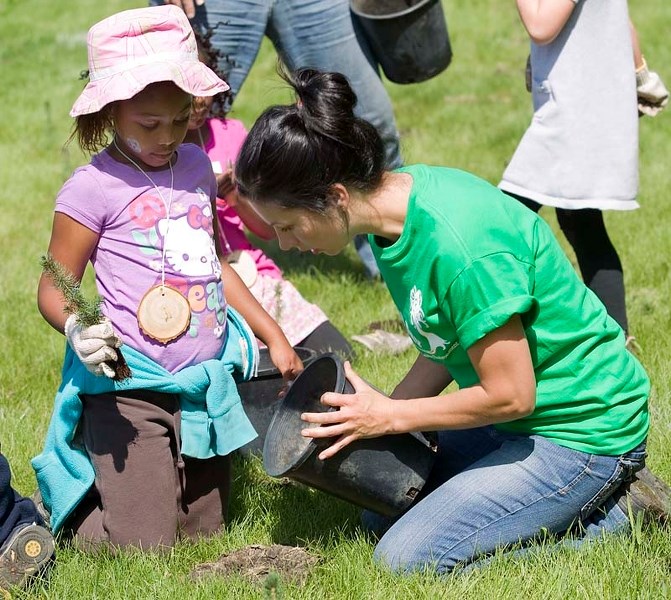Woodlands is getting woodier Wednesday thanks to a mob of elementary school arborists.
May 21 is Arbour Day in St. Albert, an annual celebration of all things tree-related. About 530 Grade 1 students from across town will be at Willoughby Park this Wednesday to plant trees and learn about forests.
Willoughby Park has been the site of three previous Arbour Day events, the last being in 2011, says Nicole Synowec, the city’s organizer for the event. This year’s event is meant to bolster plants placed in previous years, many of which have struggled.
Each student can expect to plant about two trees, likely a white spruce and some sort of shrub, Synowec said. Each will also get a tree to plant at home.
“Once they’re planted, it’s up to Mother Nature,” she said.
Students will also get to go on a nature walk, learn about trees, and check out a live great horned owl. Local entertainers Rooney and Punyi will also put on a show.
A local nature group hopes kids of all ages will help plant trees this weekend to drive some alien invaders out of Riverlot 56.
The Riverlot 56 Natural Area Society has issued a call for volunteers to help plant trees in Riverlot 56 this weekend. The planting is part of a five-year experiment meant to fight invasive weeds.
City arborist Kevin Veenstra reports that the riverlot is infested with acres of field scabious – an invasive plant known for its purple, carnation-like blossoms. It also has a lot of Canada thistle. These plants are listed as noxious weeds under provincial law, meaning that residents must contain their spread.
The society has harvested hay off the lot for many years to try and control the weeds, but the weeds keep coming back, said group spokesperson Dan Stoker.
“It’s a relentless battle which we’re never going to win unless we use nature’s own design against it.”
Weeds need lots of light, so the ultimate solution is to shade them to death, Stoker said. If the group can accelerate the expansion of the forest, the trees should crowd out the weeds.
The group plans to plant about 10 islands of 40 trees each in the infested fields this Saturday, Stoker said. More plantings will follow in the next four years, followed by an evaluation in year five.
The additional evergreens (and, in later years, native grasses) should add more animal habitat to the riverlot, Stoker said. They’ve also mapped out the plots so that they could help guide future ski trails.
“It will still take a long time for those trees to grow,” he continues.
Similar ones planted by local scout troops now serve as a windbreak between the riverlot and its south-side parking lot.
The group needs about 50 volunteers to come out and plant, Stoker said.
“They should be prepared to do gardening,” he continued, coming equipped with gloves, shovel and trowel.
Stoker hopes that residents will take ownership of this riverlot and take pride in helping to prevent a tragedy of the commons.
“Unless someone’s willing to help and make things happen, it’s not going to change.”
The event runs from 10 a.m. to noon this May 24. Volunteers should assemble at the Kingswood Park parking lot. Call Stoker at 780-965-8839 for details.
Mosquitoes are a superstitious and cowardly lot, so why not set up a bat cave in your backyard to fight them?
City residents will get to build a free bat house this Saturday at the Jack Kraft Facility (by the recycling depot) as part of Public Works Day.
The event is meant to draw more bats to the city to help combat pests such as mosquitoes, Veenstra said.
“It’s phenomenal, those bats, how much they can eat.”
The city currently has one official bat house, which is in a tree in Alderwood Park, Veenstra said. (Look for a black box with a white bat on it about 15 feet up.) Officials installed it in co-operation with a local resident who really hates mosquitoes.
Alberta Fish and Wildlife reports that little brown bats can eat about 900 bugs an hour, with most colonies devouring about 50 kilograms of bugs each summer.
“They do eat an awful lot of insects,” said Margo Pybus, a founding member of the Alberta Bat Action Team. Red Deer uses bats as part of its integrated pest management strategy.
This event is a great idea that will raise public awareness about bats, Pybus said.
“We don’t need to fear them,” she said.
The event runs from 11 a.m. to 3 p.m. Saturday. Call 780-459-1557 for details.




